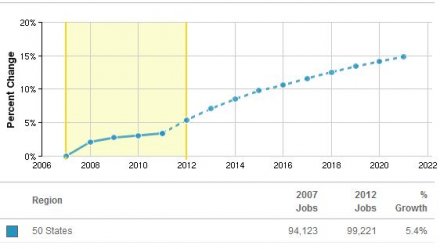
Things you should know about mental health counselors...
Mental health counseling is what people typically think of when they hear the word counseling, but counselors’ actual job duties may go well beyond what people imagine. Clinical counselors do indeed talk people through problems. In many cases, though, they diagnose as well as treat mental illness.
Jobs for mental health counselors will grow 36% through 2020. ~ Bureau of Labor Statistics
New federal regulations allow qualifying mental health counselors to serve as mental health practitioners, providing services without referral, under the TRICARE program. This is big news, as TRICARE serves between 9 and 10 million service members, retirees, and family members.
Job duties are also expanding in other sectors. Not surprisingly, there is an increased need for highly trained counselors. The Bureau of Labor Statistics has predicted that jobs for mental health counselors will grow 36% during the 2010 to 2020 decade.
Counselors typically earn less than psychiatrists or psychologists do, but that’s one thing that makes them attractive to insurance companies. The average mental health counseling salary was $42, 590 in 2010. 80% made between $24, 840 and $65, 660.
Mental Health Counselor Duties
Some mental health counselors help people who have normal cognitive processes cope with difficult life events, for example, physical illness, death of loved ones, and relationship problems or divorce. Others help people manage serious mental illnesses like bipolar disorder. Counselors need to know when to refer clients or patients for additional resources and how to identify when abuse may be happening or when there is a risk of suicide or other violence.
Cognitive therapy is among the most common techniques, but some employ other therapies. Some clinical counselors specialize and work with a particular population, for example, the elderly. Mental health counselors may work for a variety of agencies: individual and family services, hospitals, and inpatient and outpatient mental health facilities. Some are in private practice.
New federal regulations allow qualifying mental health counselors to serve as mental health practitioners, providing services without referral, under the TRICARE program.
Clinical counselors often work as part of a health care team; the team could include doctors, nurse specialists, psychologists, and even social workers.
Source: www.counselor-license.com
You might also like:




|
Counseling the Culturally Diverse: Theory and Practice Book (Wiley)
|


















Some professional psychologists identify themselves as counseling psychologists, while others describe themselves as clinical psychologists. Counseling and clinical psychologists often perform similar work as researchers or practitioners and may work side by side in any number of settings, including academic institutions, hospitals, community mental health centers, independent practice, and college counseling centers, where they may have overlapping roles and functions.
Clinical counseling is a subset of psychology that provides therapy like talk therapy, family therapy, and behavior modification.